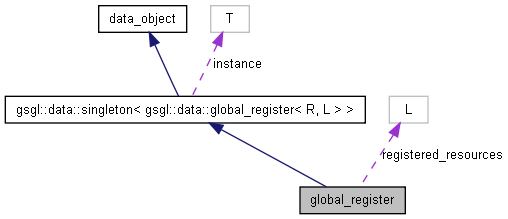global_register Class Template Reference
#include <global.hpp>


Detailed Description
template<typename R, typename L = gsgl::data::list<R *>>
class gsgl::data::global_register< R, L >
Base class for global resource registers.
They are singleton objects which delete themselves when their last registered resource unregisters itself. The resource class must implement a cleanup() function.
Definition at line 51 of file global.hpp.
Public Member Functions | |
| void | register_resource (R *) |
| void | unregister_resource (R *) |
Protected Member Functions | |
| global_register () | |
| virtual | ~global_register () |
Static Protected Member Functions | |
| static global_register< R, L > * | global_instance () |
| Reimplemented in order to auto-create. | |
Protected Attributes | |
| L | registered_resources |
Constructor & Destructor Documentation
| global_register | ( | ) | [inline, protected] |
Definition at line 70 of file global.hpp.
| ~global_register | ( | ) | [inline, protected, virtual] |
Definition at line 77 of file global.hpp.
Member Function Documentation
| static global_register<R,L>* global_instance | ( | ) | [static, protected] |
| void register_resource | ( | R * | r | ) | [inline] |
Definition at line 83 of file global.hpp.
References global_register::registered_resources.
Referenced by broker_creator::broker_creator(), and log_target::log_target().
| void unregister_resource | ( | R * | r | ) | [inline] |
Definition at line 99 of file global.hpp.
References global_register::registered_resources.
Referenced by broker_creator::~broker_creator(), and log_target::~log_target().
Member Data Documentation
L registered_resources [protected] |
Definition at line 55 of file global.hpp.
Referenced by broker::create_object(), broker::has_object(), logger::print_line(), global_register::register_resource(), and global_register::unregister_resource().
The documentation for this class was generated from the following file:
 1.5.5
1.5.5